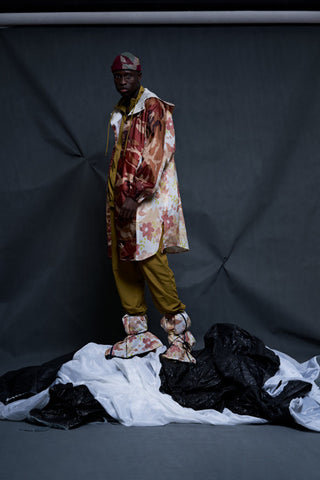
Breaking the Fast Fashion Cycle: 8 Upcycling & Slow Fashion Brands From the Nordics That are Making a Difference in 2023
Teilen
Fashion is an exciting and ever-evolving industry that captures our imaginations and keeps us on our toes. However, the truth behind the fashion industry is not always so glamorous. Fast fashion, in particular, has taken the world by storm over the last few decades, tempting us with affordable, trendy clothes that we can buy at a moment's notice. On average, Europeans buy more than 40 pieces of clothing per year. What people are slowly starting to realise is the enormous environmental and social impact of fast fashion. For example, producing a single cotton t-shirt requires an average of 2,500 liters of water, which is equivalent to what one person drinks in 2.5 years. The production of these clothes involves massive amounts of non-renewable resources, while the workers making these fashion items are often subjected to poor working conditions and low wages.
Transforming waste into fashion: The rise of upcycling in sustainable fashion
To tackle the environmental and social issues of fast fashion, it's essential to find sustainable alternatives that balance fashion with environmental and social responsibility. Upcycling is one such solution that's becoming increasingly popular in the fashion industry. It is our preferred solution since it comes highest in the waste hierarchy, when the textiles cannot be reused. Not only does upcycling reduce waste, but it also creates unique and stylish products that can't be found anywhere else. The concept of upcycling involves taking old, unwanted materials and transforming them into something new and valuable.
Unlike recycling, which involves breaking down materials into their base components and then reusing them to create new products, upcycling aims to create something new and valuable from existing materials without destroying them. Exactly, like when we turn discarded jeans into stylish sneakers at VAER. This approach minimises the amount of waste produced and reduces the need for new resources, making it a more sustainable option than traditional recycling.
Meet the 8 upcycling brands making a difference in sustainable fashion in 2023
Looking to jazz up your wardrobe with sustainable fashion? Keep your eyes peeled for these eight upcycling and slow fashion brands from Scandinavia making waves in 2023! As fast fashion's environmental impact gains more attention, these brands are stepping up to the plate with innovative ways to repurpose textile waste into stylish, high-quality garments. These Nordic brands are breaking the fast fashion cycle, proving that it is indeed possible to create beautiful, fashionable products while respecting the environment and human rights. So, join us as we explore the world of upcycling and slow fashion and discover how these Scandinavian brands are paving the way for a more sustainable and ethical future in fashion.
OUR SHIFT: The Danish brand co-creating a movement for a responsible fashion industry
OUR SHIFT upcycles abandoned and deadstock fabrics and clothes to create garments of the highest quality. At the heart of OUR SHIFT's mission is taking action and creating awareness. "Through our activist collections, we are creating awareness about the problems in the fashion industry and by upcycling clothes, we are preventing them from going to landfills or being burnt.", say Milan and Barbora, the designer duo behind OUR SHIFT.
Besides offering designer clothes upcycled from discarded festival tents, OUR SHIFT also offers custom-upcycled clothes, giving you the opportunity to add a designer twist to a garment of good quality or find a unique outfit for a special occasion. And for those looking to shine at an important event, you can also rent their unique upcycled clothes.

ILAG: The Norwegian brand embracing togetherness, sustainability, and style
ILAG, meaning "togetherness" in Norwegian, is a conscious brand established in 2020. The Norwegian brand is committed to using natural, surplus, and certified recycled materials. ILAG designs clothes for multiple use, aiming to make them comfortable enough for customers not to want to take them off.
With a deposit system available in Norway, customers receive a discount on a new purchase when returning a used ILAG item. ILAG is transparent about where and by whom their garments have been made - we love that they name the actual factory where their fashion items were produced for each product!

BAKANO: The Latin American-Nordic brand offering unique bags made from upcycled leather sofas
BAKANO is a slow fashion brand that offers handcrafted bags made from upcycled leather, including used leather sofas, discarded leather jackets, and leftover materials from the leather industry. The Danish brand is committed to reducing waste and increasing the lifespan of its products by offering repairs and alterations to bags, clothing, and other leather items. You can even send in any old leather jacket or similar to BAKANO and they’ll turn it into a “memory bag” like our co-founder Emma did with her grandmother’s beloved leather jacket!
BAKANO also offers made-to-order bags, custom designs, and collaborates with businesses to manage their textile waste in a sustainable way. The brand's designer, Wilmar Neto Carvajal, is a Colombian fashion designer with over 25 years of experience in leather production and repair.

Tripulse: The Swedish Fashion Brand Revolutionising Sustainable Activewear
Tripulse is a Swedish sustainable activewear brand with a mission to take the plastic out of sportswear and to create high performance, timeless athletic apparel made from innovative natural materials. They prioritise sustainable practices throughout the entire product life cycle, as well as ethical and transparent supply chains. They only partner with suppliers that adhere to fair and ethical practices, and their clothing production factory in Portugal is GOTS-certified. All employees of their production partner are paid above minimum wages, and their suppliers receive 3rd party audits to ensure high standards are being adhered to.
Tripulse uses sustainable and functional materials, predominantly TENCEL™ lyocell, that have great performance features during athletic activities, such as being naturally breathable, bacteria- and odour-resistant and skin-friendly. They want to free athletic clothing from plastics and toxins and to ensure that at the end of their lifetime, their clothes can either biodegrade back to nature or new clothing can be made out of them.
We can confirm from our own experience that their activewear is not only saving resources but also very comfortable and stylish to wear while doing sports!

Residus: The Swedish brand setting a new standard with transparent supply chains
Residus is a sustainable and ethical fashion brand based in Stockholm, Sweden, creating long-lasting garments. They offer high-quality products made with low-impact materials and transparent supply chains, including surplus fabric and certified fibres like TENCEL, organic cotton, and Gotland sheep wool.
Residus is committed to responsible European production and ensures that their factories and mills are located nearby to reduce environmental impact. They offer QR-codes on their garments' care labels, allowing customers to trace the product's supply chain from raw material to manufacturing.

Lovia: The Finnish brand offering upcycled bags and transparent pricing
Lovia strives to create a modern circular economy by rescuing discarded resources and using them to make timeless design items such as bags. Lovia wants to turn the vicious cycle of overproduction and overconsumption around and be transparent about its operations, including carbon footprint, materials, makers, and pricing. Yes, they even show you in detail how much the production cost and which share of the price you pay equals their profit. Lovia believes that change can be achieved by being honest about the reality behind its items and advocates for greater transparency to achieve sustained change.
The brand uses excess leather and textile from the Finnish furniture industry, salmon leather from food production by-products, and elk hides from government-regulated population-control hunting to create its items. Lovia's mission is to utilise as much of wasted materials as possible and turn them into everlasting products while diminishing their relative carbon footprint - a mission that we share 100% at VAER!

Pond: The Danish brand offering urban dipping swimwear for men from recycled fibres
Pond is a Danish fashion brand that designs swimwear and essentials for urban dipping with a focus on aesthetics, functionality and longevity. Their pledge is to be transparent about their supply chain, produce small batches to avoid deadstock, and continuously work to lower their carbon footprint.
Pond's swim briefs contain approximately 20% recycled fibres made from at least 50% recycled scraps from virgin nylon production. The recycled fibres save 45% CO2 and 39% water compared to producing virgin nylon, making the swim briefs a more climate-friendly choice. The brand prioritises regional sourcing and manufacturing, and uses minimalist, plastic-free packaging to reduce their environmental impact further.
To round off their environmental efforts, Pond donates 1% of their profits to an environmental organisation chosen by the Pond community. This commitment to the environment extends beyond their products and into their practices, including hosting exclusive dip sessions to inspire and encourage city slickers to both use and care for their local harbour or 'blue park', as the brand likes to put it.

Copenhagen Cartel: The Danish brand using stylish female swimwear to promote ocean conservation
Copenhagen Cartel is a Danish fashion brand dedicated to creating positive change and preserving the world's oceans. The brand actively participates in cleaning up the ocean and creates products, collaborations, and initiatives that spread awareness and inspire others to restore and stay smart with ocean resources.
Copenhagen Cartel prioritises responsible material selection and production methods and uses innovative materials such as regenerated nylon yarn, recycled polyester, and their own patented material made from seaweed and organic cotton. Their products serve as conversation starters to educate and inspire more people to see the value and potential available when restoring the alliance between the ocean and humans.

You have the power to break the fast fashion cycle: A call to action for sustainable fashion consumption
By supporting upcycling and slow fashion brands, you can make a difference in the fashion industry while enjoying a host of benefits. Not only does upcycling help to reduce the environmental impact of fashion production, but it also gives you access to unique and high-quality products that are built to last. From BAKANO in Denmark to ILAG in Norway, we've introduced you to nine upcycling and slow fashion brands based in Scandinavia that are leading the way in sustainable fashion. It’s time to make more conscious choices in our fashion consumption. Join us in supporting more sustainable brands and paving the way for a better future for fashion!
